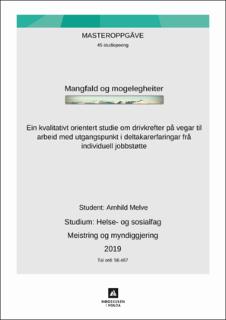| dc.description.abstract | Føremål og problemstilling: I individuell jobbstøtte (IPS) er deltakars ønske og val avgjerande rettesnorer. Føremålet med studien er å undersøkje kva som fremmar og hemmar motivasjonen for arbeid i utgangspunktet og undervegs i jobbstøtteløpet, og korleis IPS kan verke inn på slike forhold. Hovudproblemstillinga er: Korleis kan vi forstå motivasjonen for arbeid mellom deltakarar i individuell jobbstøtte? Avhandlinga legg til grunn at motivasjon inneheld både individuelt og strukturelt avhengige drivkrefter, som kan vere så vel medvitne som umedvitne. Eg har valt kritisk realisme som vitskapsteoretisk utgangspunkt, og brukar praksisteori og livsløps-, anerkjennings- og sjølvbestemmingsteori som verktøy i møte med empirien. Vidare søkjer eg å ha eit samfunnshistorisk blikk på materialet.
Metode: For datainnsamling la eg til rette for livshistorisk orienterte, forteljande intervju med åtte tidlegare jobbstøttedeltakarar kombinert med ei spørjeundersøking retta mot aktive deltakarar. Intervjua, som utgjer det primære datatilfanget, var tematisk retta inn mot utdanning, arbeidshistorikk og jobbstøtte. I analyse og drøfting av materialet freistar eg å kombinere ulike fortolkande strategiar med retroduktive og abduktive resonnement. Frekvensanalyse av svar frå spørjeundersøkinga gir supplerande informasjon om motivasjon for og erfaringar frå jobbstøtte.
Resultat: Intervjumaterialet gir inntrykk av ein nær samanheng mellom motivasjonen for arbeid og faktiske mogelegheiter for arbeid. Meistringsforventningar basert på kroppsleggjorde erfaringar og å bli myndiggjort gjennom jambyrdig samhandling, er døme på motivasjonsfremmande forhold. Vanskeleg tilgang til høveleg arbeid og stigma assosiert med å trenge hjelp, står derimot fram som nokre av barrierane som både hemmar motivasjon for arbeid og det å faktisk kome i arbeid. Deltakarane i begge studiedelar formidlar at ønsket om arbeid handlar om materiell tryggheit og sjølvstende til å bestemme i eige liv. Ønske om sosialt tilhøyr, å bruke og utvikle ferdigheiter, og synet på arbeid som ein viktig del av livet, er motiv svara i spørjeundersøkinga formidlar. I generelt positive tilbakemeldingar om tilbodet, vektlegg deltakarar engasjement og emosjonell støtte frå jobbspesialisten som særleg nyttig.
Konklusjon: Tre poeng summerer opp svar på hovudproblemstillinga: 1) Å sjå motivasjonen for arbeid som spel og samspel mellom drivkrefter og motkrefter på individ-, samhandlings- og samfunnsnivå. 2) Arbeidsmotivasjon kan sjåast som uttrykk for opplevd handlingskapasitet. 3) Motivasjon heng saman med å kunne gjere ein positiv skilnad. Å bli møtt med reell anerkjenning, kan vere fundamentet for å kjenne seg kapabel i møte med arbeidslivet, og for å gi arbeidsmotivasjonen vidare vekstvilkår. Standardiseringa IPS føreset, kan vere dei ytre rammene som trengst for å kunne realisere skreddarsydd oppfølging. | en_US |
| dc.description.abstract | Abstract
Objective: In Individual Placement and Support (IPS), the participant’s wishes and choices are decisive guidelines. The study aims to investigate what can promote and inhibit the motivation to work in the first place, and subsequent during the IPS-process. Another question is how IPS can affect such conditions. The main issue is: How can we understand the motivation for work among participants in IPS? The dissertation assumes that motivation contains both individual and structurally dependent driving forces, which can be both conscious and unconscious. The study is based on critical realism. Theories of practice, life-course, recognition, and self-determination, together with descriptions of social-historical conditions, are some of the perspectives I will use to explore and illuminate empirical data.
Methods: For data collection, I facilitated life-history-oriented, narrative interviews with eight former IPS-participants combined with a questionnaire aimed at active participants. The interviews, which constitute the primary data resource, were thematically focused on education, work history, and IPS. I will use different interpretative strategies, combined with retroductive and abductive reasoning, to analyze and discuss the material. Frequency analysis of responses to the survey provides additional information about the motivation and experiences of participating in IPS.
Results: The interview material gives an impression of a close connection between the motivation for work and actual opportunities to get work. Self-efficacy based on embodied experiences and to feel empowered through equal partnership, are examples of factors that promote motivation. On the other hand, difficult access to appropriate jobs and the stigma associated with needing help, stand out as some of the barriers that both inhibit motivation for work and the possibility to get into work. Participants from the interview section and the survey have in common that the desire for work is about finances and the possibility to decide for themselves in their own lives. Answers to the survey show motives such as a need for social relatedness, to use and develop skills, and an attitude that work is an important part of life. In their generally positive feedback, participants emphasize the involvement and the emotional support of the Employment Specialists as particularly helpful.
Conclusions: Three points summarize answers to the main issue: 1) To understand the motivation for work as an interplay between driving forces and counter forces at the individual, interaction, and social levels. 2) Work motivation as an expression of perceived capacity for action. 3) Motivation is linked to the experience to make a positive difference. To be recognized and valued as a contributor might provide a foundation for feeling capable of participating in the working life, and of importance for further growth in motivation for work. The standardization in IPS might be the external framework needed to enable tailor-made follow-up. | |
